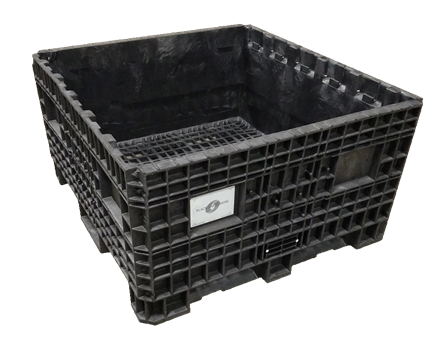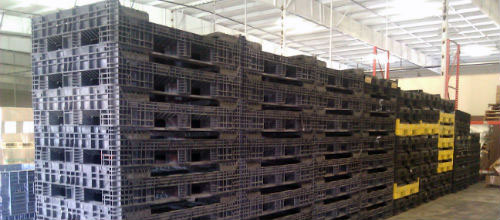Explore efficient storage ideas using refurbished bulk containers in manufacturing
Wiki Article
The Ultimate Guide to Selecting the Right Mass Containers for Your Service Requirements
Choosing the suitable mass containers is essential for any business that depends on effective logistics. Various kinds of containers exist, each made for specific products and applications. Variables such as dimension, product compatibility, and regulative requirements play a considerable duty in this decision-making procedure. Understanding these elements can lead to improved operational efficiency. Numerous businesses forget vital elements that could improve their total effectiveness and sustainability. What are these considerations?Comprehending Various Sorts Of Bulk Containers
Bulk containers function as essential devices for companies looking for effective storage and transport remedies. These containers are available in different kinds, each developed to satisfy certain operational requirements. One common kind is the intermediate bulk container (IBC), which is perfect for granulated and fluid materials, using a balance of capability and ability to move. One more preferred choice is the mass bag, or FIBC, suitable for completely dry, flowable products. These flexible containers are lightweight and can be easily transferred and saved. For much heavier materials, stiff mass containers are often utilized, giving durability and stability for secure handling. Furthermore, there are specialized containers customized for unsafe materials, making sure compliance with safety policies. Comprehending the distinctive attributes of these bulk container kinds enables companies to make enlightened decisions that enhance logistics and decrease prices. By picking the best container, firms can boost their operational efficiency and improve their supply chain processes.Trick Material Considerations for Bulk Containers
When picking bulk containers, it is vital to contemplate the products made use of in their building and construction. Factors such as toughness, durability, and chemical compatibility play a critical function in making sure the containers fulfill details operational needs. Furthermore, weight and transportability worries can influence both efficiency and transport logistics.Material Longevity and Toughness
Toughness and strength are essential elements in picking materials for mass containers, as they straight influence the container's capability to hold up against numerous ecological problems and managing processes. Materials such as high-density polyethylene (HDPE), polypropylene, and stainless-steel are frequently preferred for their durable residential or commercial properties, providing resistance to abrasion, impact, and temperature fluctuations. The choice of product additionally affects the general life-span of the container; more powerful products commonly result in much less constant replacements, resulting in cost financial savings in time. Additionally, the weight of the product can influence shipping expenses and ease of handling. Businesses should consider their particular operational settings and the possibility for damage to guarantee peak toughness and stamina in their bulk container choice.Chemical Compatibility Elements
Recognizing chemical compatibility is necessary for picking mass containers, as the materials utilized must withstand the particular compounds they will certainly hold. Various variables affect compatibility, consisting of the chemical nature of the materials, temperature, and duration of storage space. Harsh chemicals might need containers made from stainless steel or specialized plastics that resist degradation. Additionally, responsive compounds can produce heat or gases, demanding aired vent or pressure-rated containers. The option of container product, whether steel, polycarbonate, or polyethylene, should line up with the chemical residential or commercial properties of the stored compounds to stop violations or leakages. Eventually, a detailed analysis of these compatibility factors ensures secure handling and storage, shielding both workers and the setting while maintaining item honesty.Weight and Mobility Worries
Choosing bulk containers entails not only evaluating chemical compatibility however likewise taking into consideration weight and mobility. Organizations have to examine the ease of handling and transport to optimize performance. Light-weight products like high-density polyethylene (HDPE) or light weight aluminum can help with simpler motion and minimize shipping costs. On the other hand, heavier containers might supply enhanced longevity but can impede movement, specifically in environments needing frequent moving. Furthermore, the layout of the container need to permit hassle-free training and stacking, making sure ergonomic safety for employees. Companies need to additionally think about the framework offered for transport; as an example, containers compatible with forklifts or pallet jacks can simplify procedures. Ultimately, the ideal equilibrium between weight and transportability straight affects functional efficiency and price efficiency.Sizing Your Bulk Containers for Optimum Effectiveness
When sizing bulk containers, services have to carefully assess the measurements required to accommodate their details products. In addition, weight ability is a vital aspect that affects effectiveness and safety and security throughout transport and storage. Effective sizing not just takes full advantage of area however also optimizes operational workflows.Determining Container Capacities
Choosing the best dimensions for mass containers is important for optimizing efficiency in storage and transport. Organizations must examine their specific requirements, considering variables such as offered space, the nature of the products being kept, and the techniques of transport utilized. Exact dimensions assure that containers fit preferably in vehicles and storehouses, reducing squandered room and reducing dealing with time. Criterion dimensions can supply ease, however custom-made dimensions could be required for special requirements or to suit details items. In addition, it is necessary to review stacking capacities and availability, as these factors influence overall operational performance. Inevitably, the best measurements result in boosted organization and streamlined logistics, benefiting the total efficiency of business.Weight Capability Considerations
Recognizing weight ability is vital for services aiming to maximize their mass container effectiveness. The weight capability of a container straight affects storage space abilities, transportation logistics, and overall operational costs. Choosing containers with the proper weight limitations guarantees that companies can safely save and transfer their goods without running the risk of damages or conformity concerns. Overwhelming containers can bring about architectural failings, while underutilizing capacity lead to thrown away sources. It is essential for services to evaluate their item weights and consider any type of regulative demands when choosing containers. Furthermore, Check This Out aspects such as the sort of material, planned usage, and ecological problems need to additionally affect weight capacity decisions. By examining these components, companies can enhance performance and ensure a structured supply chain.Governing Compliance and Safety Criteria

Regulatory conformity and security criteria play an important function in the option of mass containers for services. Organizations has to ensure that their containers meet various policies established by local, national, and global authorities. These requirements commonly view it now relate to product safety, architectural honesty, and proper labeling, which aid prevent crashes and assure the secure transport of goods.
In addition, adherence to industry-specific standards, such as those from the Food and Medication Administration (FDA) or the Occupational Security and Wellness Administration (OSHA), is crucial for business managing dangerous products or food. Non-compliance can lead to fines, lawful issues, or damage to a business's credibility.
Companies ought to also take into consideration the container's compatibility with the materials being stored or moved to prevent contamination or chain reaction (refurbished bulk containers). To sum up, understanding and executing governing conformity and safety standards is essential for the effective and accountable use mass containers
Sustainability Options for Eco-Friendly Mass Containers

Business are also discovering alternatives made from recycled products, which not just save sources yet additionally sustain the recycling market. In addition, innovations in design enable for lighter containers that require less energy to transport, better enhancing sustainability. By incorporating these eco-friendly mass container choices, companies can show their dedication to ecological stewardship while meeting consumer demand for lasting techniques. This shift not just assists the planet but can additionally boost brand name online reputation and client loyalty.
Cost-Effectiveness and Budgeting for Bulk Containers
While lots of services concentrate on sustainability, cost-effectiveness stays a crucial variable when choosing bulk containers. Organizations needs to analyze the first acquisition rate, in addition to long-lasting functional expenses, to assure financial stability. Factors such as reusability, durability, and upkeep play a considerable function in establishing overall costs.Purchasing i was reading this top notch containers may generate greater ahead of time expenses yet can bring about savings through lowered substitute prices and decreased waste. In addition, organizations should think about transport prices and storage efficiency, as these can influence the total budget plan.

Often Asked Concerns
Just how Do I Determine the Right Container for Hazardous Products?
To identify the ideal container for harmful products, one need to review compatibility with the material, consider the container's product, look for governing compliance, and evaluate ability and safety and security features to assure correct handling and storage space.Can Mass Containers Be Customized for Particular Products?
Yes, bulk containers can be tailored for details items. used collapsible containers. Various features, such as style, product, and dimension, can be customized to meet unique needs, guaranteeing perfect security and performance for transferring and keeping different itemsWhat Is the Typical Life-span of Various Bulk Container Types?
The average life-span of mass container types varies; plastic containers last 5-10 years, metal containers 10-20 years, and wooden containers typically last 3-7 years, depending on use, maintenance, and ecological problems.How Should I Tidy and Maintain Bulk Containers?
To clean and maintain bulk containers, one must routinely evaluate for damages, get rid of deposit, wash with proper cleaning agents, wash completely, and assurance appropriate drying out prior to storage space. Following maker standards improves long life and safety and security during use.Exist Rental Choices for Mass Containers Available?
Yes, countless companies provide rental alternatives for mass containers, providing adaptability for businesses. These rentals can fit different needs, enabling firms to handle inventory effectively without the commitment of acquiring containers outright.Toughness and strength are essential aspects in choosing materials for mass containers, as they directly affect the container's capacity to stand up to different ecological conditions and handling procedures. Recognizing chemical compatibility is essential for choosing mass containers, as the products made use of need to withstand the particular substances they will hold. Recognizing weight capacity is essential for organizations intending to maximize their mass container effectiveness. Regulative conformity and security criteria play a crucial function in the choice of mass containers for services. While several companies concentrate on sustainability, cost-effectiveness continues to be a critical factor when picking mass containers.
Report this wiki page